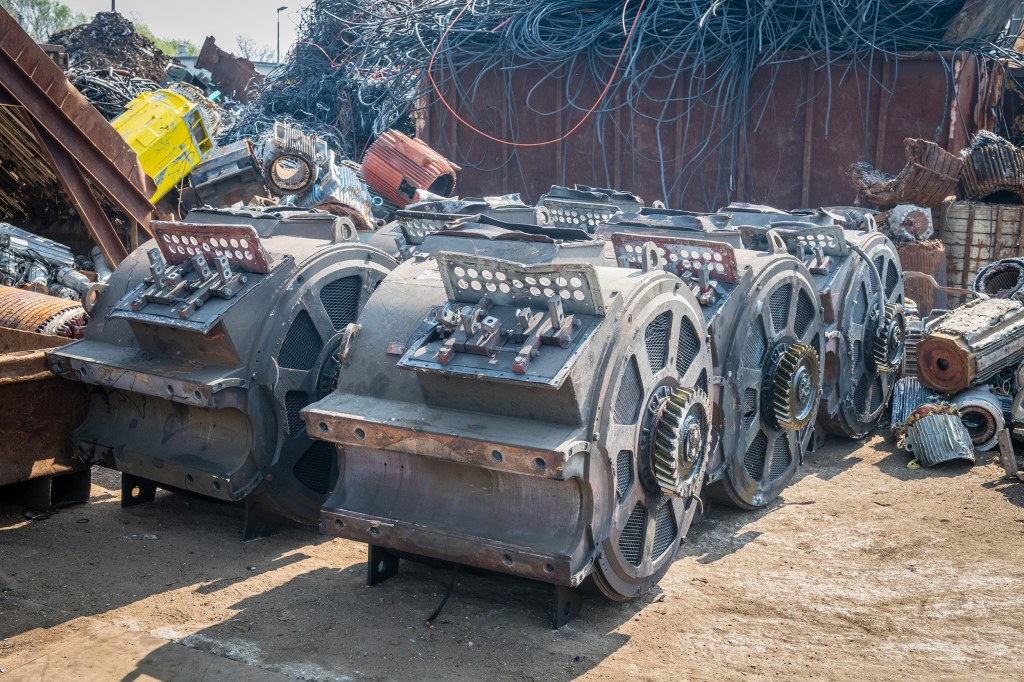Revitalize Through Recycling: Unleash The Power Of Recycle Electric Motors Now!
Recycle Electric Motors: Reducing Waste and Promoting Sustainability
Greetings, Smart Readers!
Electric motors have become an indispensable part of our modern lives, powering various machines and devices that are crucial to our daily activities. However, with the constant advancement of technology, these motors are often replaced or discarded, leading to a significant amount of electronic waste. In this article, we will explore the importance of recycling electric motors and how it can contribute to a more sustainable future.
2 Picture Gallery: Revitalize Through Recycling: Unleash The Power Of Recycle Electric Motors Now!
Introduction
1. What are Electric Motors?

Image Source: intercotradingco.com
Electric motors are devices that convert electrical energy into mechanical energy. They are widely used in a range of applications, from powering household appliances to driving industrial machinery. These motors play a crucial role in our daily lives, but their disposal poses a significant environmental challenge.
2. The Need for Recycling
With the rapid growth of technology, the demand for electric motors continues to rise. As a result, the disposal of old or faulty motors has become a pressing issue. Traditional methods of disposing of these motors, such as landfilling or incineration, not only contribute to pollution but also waste valuable resources. Recycling electric motors is the sustainable solution that can help mitigate these problems.

Image Source: skmetals.de
3. Benefits of Recycling Electric Motors
Recycling electric motors offers several advantages, both for the environment and the economy. Firstly, it reduces the amount of electronic waste that ends up in landfills or incinerators. By extracting valuable materials from these motors, such as copper, aluminum, and rare earth metals, recycling helps conserve natural resources. Additionally, the process of recycling electric motors requires less energy than manufacturing new ones, resulting in a reduced carbon footprint.
4. The Process of Recycling
The recycling process for electric motors involves several steps. First, the motors are collected from various sources, including households, businesses, and industries. Then, they undergo dismantling, where the different components, such as the rotor, stator, and housing, are separated. The materials are then sorted and sent for further processing, such as shredding or melting, to recover valuable metals. Finally, the extracted materials are reused in the manufacturing of new products.
5. Recycling Initiatives and Regulations
Recycling electric motors is not only an individual effort but also requires the collaboration of governments, businesses, and communities. Many countries have implemented regulations and policies to encourage the proper disposal and recycling of electronic waste, including electric motors. Recycling centers and specialized facilities have also been established to handle the recycling process efficiently.
6. The Future of Recycling Electric Motors
As the awareness of environmental issues continues to grow, the importance of recycling electric motors is gaining recognition. Innovations in recycling technologies and the development of more efficient motors are paving the way for a more sustainable future. By embracing recycling initiatives and investing in research and development, we can create a circular economy where the materials from old electric motors are continuously reused.
Advantages and Disadvantages of Recycling Electric Motors
Advantages:
1. Resource Conservation: Recycling electric motors helps conserve valuable materials like copper and aluminum, reducing the need for mining and extraction.
2. Energy Efficiency: The process of recycling electric motors requires less energy compared to manufacturing new motors, resulting in reduced greenhouse gas emissions.
3. Waste Reduction: By recycling electric motors, we can significantly reduce the amount of electronic waste that ends up in landfills or incinerators.
4. Job Creation: The recycling industry creates employment opportunities, contributing to economic growth.
5. Environmental Protection: Recycling electric motors helps prevent the release of harmful substances into the environment, such as lead and mercury.
Disadvantages:
1. Complex Recycling Process: Recycling electric motors involves intricate processes and requires specialized knowledge and equipment.
2. Cost Considerations: The recycling process can be costly, depending on the scale and complexity of the operation. However, the long-term benefits outweigh the initial investment.
3. Limited Infrastructure: In some areas, the infrastructure for recycling electric motors may be insufficient, making proper disposal and recycling challenging.
4. Environmental Impacts: While recycling is beneficial, the transportation and processing of electric motors can still have environmental impacts, such as carbon emissions and energy consumption.
5. Lack of Awareness: Many individuals and businesses are unaware of the importance and benefits of recycling electric motors, leading to improper disposal.
Frequently Asked Questions (FAQs)
1. Can electric motors be recycled?
Yes, electric motors can be recycled. Recycling centers and specialized facilities handle the proper disposal and recycling of these motors.
2. What materials can be recovered from recycled electric motors?
Recycled electric motors can recover valuable materials such as copper, aluminum, and rare earth metals.
3. How can I recycle an electric motor?
You can recycle an electric motor by contacting local recycling centers or electronic waste collection facilities in your area.
4. What are the benefits of recycling electric motors?
Recycling electric motors helps conserve resources, reduce waste, and minimize environmental impacts associated with manufacturing new motors.
5. Are there any regulations regarding the recycling of electric motors?
Many countries have implemented regulations and policies to encourage the proper disposal and recycling of electronic waste, including electric motors.
Conclusion
In conclusion, recycling electric motors is crucial for reducing electronic waste, conserving resources, and promoting sustainability. By embracing recycling initiatives, we can contribute to a cleaner and more efficient future. It is essential for individuals, businesses, and governments to work together to create a circular economy that prioritizes the recycling and reuse of electric motors. Let us all make a conscious effort to recycle and protect the environment for future generations.
Final Remarks
Recycling electric motors is not just an environmental responsibility; it is an opportunity to create a more sustainable future. By recycling these motors, we can conserve resources, reduce waste, and minimize the environmental impact of manufacturing new motors. However, it is crucial to ensure that the recycling process is conducted properly and efficiently to maximize its benefits.
Remember, every action counts, and your participation in recycling initiatives can make a significant difference. Together, let’s embrace the power of recycling and pave the way for a greener tomorrow!
This post topic: Electric



